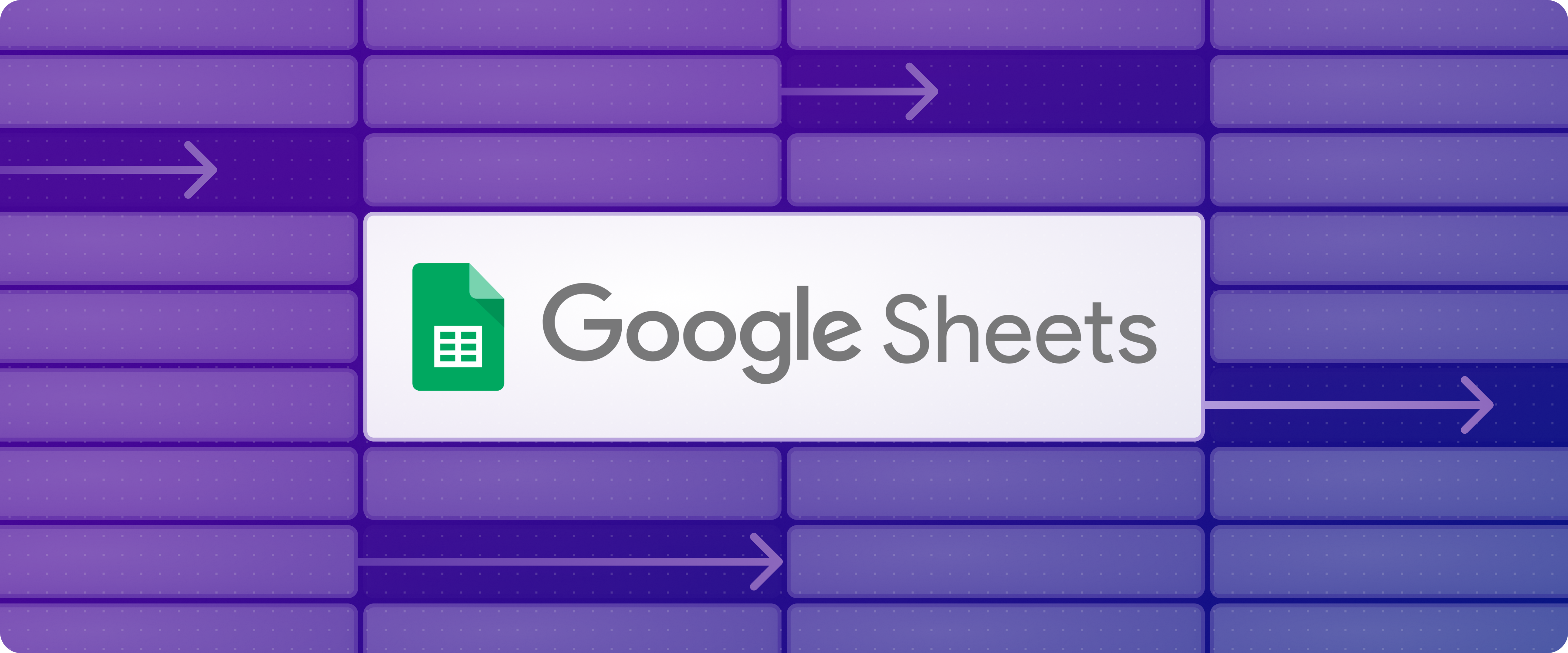
During my time as Product Lead at Google Workspace, I came to appreciate the deceptive simplicity of Google Sheets.
Despite the allure of more complex software, a well-developed spreadsheet can often look after multiple business processes—from accounting to project management or acting as a basic CRM. Sheets is proof that simplicity and functionality can coexist (plus as a startup founder, the features-to-costs ratio is unmatched!)
With Relay.app's automation, you can amplify the features that make Google Sheets such a powerful tool, and transform it into the central engine of your business. I wanted to share a few ways you can automate Google Sheets, to show that sometimes the simplest tools (and smart workflow automation) are all you need.
1. Add new data to your spreadsheet
As a startup founder, every minute counts. On any given day I jump between leading projects, getting hands-on with customer support queries, brainstorming our next big product launch, and a million other things. The last thing I want is to waste my valuable time adding information to a spreadsheet.
By automating this type of busy work I can make sure data lands directly where it needs to be. It's immediate, more accurate, and perfectly organized, without the tedium of having to do it myself. Here are a few ways you can make it happen with Relay.app:
From forms and surveys
Using product surveys? Customer feedback surveys? Contact forms? By connecting Google Sheets with your builder of choice, you open a direct line for customer insights, queries, or leads to flow into your spreadsheets.
From emails
Email is the primary customer communication channel for sales, support requests, or general feedback. Routing these emails into a Google Sheet means you can structure the data and have all customer interactions neatly organized and ready for action. It also keeps your inbox manageable, and ensures messages are logged safely.
From your calendar
Meetings are a critical part of team planning and collaboration. Now you might use a tool like Notion to sync your scheduling tools with meeting notes, etc. But you can achieve a lot of the same functionality through Google Sheets by logging each appointment, meeting or call directly into a spreadsheet. You can even append meeting notes and relevant docs (say your notes in Google Docs), or use our in-line AI to summarize or describe the meeting to give you a refresher beforehand.
From your CRM
Your CRM is the backbone of your marketing and sales funnel. But sometimes it's nice to have a platform-agnostic backup to log new leads and contacts. This can be useful for sharing information across your team, without needing to teach every person the ins and outs of your complex CRM. (It's also possible to just use Google Sheets as a CRM too).
2. Update your spreadsheet after important events
Automated updates mean your Google Sheets evolve into a real-time dashboard, offering a snapshot of the latest developments, without you having to lift a finger. Here's how you can leverage Relay.app to ensure your data is always fresh:
Sync CRM updates
The details in your CRM don't stand still. As your contacts evolve—maybe they change roles, companies, or contact information—Relay ensures these updates are mirrored in your Google Sheets. This guarantees your outreach is always accurate and personalized, positively impacting your customer relationships.
Stay on top of support tickets
Customer service isn't just about addressing issues; it's about doing so efficiently and transparently. When the status of a support ticket shifts within tools like Intercom or Zendesk, having this reflected in your Sheets means your team can pivot resources effectively, ensuring customer satisfaction remains high.
Track e-commerce transactions
Online sales move quickly, and so should your tracking. As orders are placed, shipped, and delivered, automate the logging of these stages in Google Sheets via your e-commerce platform, like Shopify or WooCommerce. This automation streamlines your fulfilment process, ensuring customers are kept in the loop and satisfied with their purchasing experience.
Monitor subscription changes
For subscription-based models, staying informed about subscription statuses is crucial. Automating the logging of cancellations or changes in platforms like Stripe or Paddle into Google Sheets allows for proactive account management. This supports your retention strategies, helping you maintain and grow your base.
3. Automate actions based on spreadsheet changes
By setting up automated triggers, you can ensure that your business not only reacts in real time to developments but also proactively engages with customers, team members, and leads. By automating repetitive tasks right from your spreadsheet, you can turn it into a command center that monitors and engages with the rest of your business systems.
Send personalized follow-up emails
You can use Relay.app to automatically send out templated emails when a new entry is added to your Google Sheets. For example, when a new lead fills out a contact form and their information populates your sheet, an introductory email campaign can be sent out. Plus, you can use our in-line AI to customize emails to each particular user.
Trigger Slack notifications
Keep your team instantly informed with automated Slack messages triggered by specific events in Google Sheets. Whether it's a new sale, a customer issue, or a key performance metric update, you can ensure that relevant team members are alerted in Slack at the right time, and even generate messages automatically with AI summaries.
Schedule meetings automatically
When a new meeting or task is logged in your Google Sheets, have Relay automatically create an event in Google Calendar. This can be particularly useful for scheduling follow-ups with leads, planning team meetings, or setting reminders for important deadlines, ensuring that nothing falls through the cracks.
Update CRM records
If information in your Google Sheets changes—such as a lead's status or contact details—have these updates automatically reflected in your CRM system. This seamless flow of information keeps your sales pipeline current and ensures that all team members have access to the latest data, enhancing your sales efforts.
Generate documents with accurate data
For businesses that rely on proposals, contracts, or personalized reports, Relay can automatically generate these documents using data from Google Sheets. By filling placeholders with specific information from your sheet, you create custom documents on the fly, ready to be sent to clients or stakeholders, streamlining your document creation process and ensuring accuracy.
Over to you
By embracing these Google Sheets automation you really can save your business valuable time, and money better spent on other activities—like growth, innovation, and the countless other tasks vying for your attention.
This list is just the beginning, too. There are hundreds of ways you can automate Google Sheets based on the particularities of your unique use case. If you need a hand, reach out to me directly on LinkedIn, or get in touch at support@relay.app.
Related reading:
